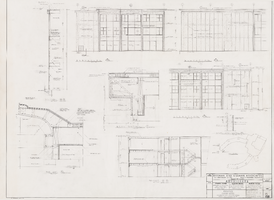Search the Special Collections and Archives Portal
Search Results
Joan Olson Griffith oral history interview
Identifier
Abstract
Oral history interview with Joan Olson Griffith conducted by Sharee Schrader on April 12, 2005 for the History of Blue Diamond Village in Nevada Oral History Project. Griffith begins by discussing why she moved to Blue Diamond, Nevada with her family due to job opportunities at the Blue Diamond Plant, where they manufactured wallboard, in 1956. She describes life in Blue Diamond and rural Nevada, the education available in the village, and Blue Diamond's proximity to Bonnie Springs Ranch and structures made for the filming of Western themed media. Griffith concludes by discussing how Blue Diamond has changed since the 1950s and being a Sunday school teacher for eighteen years.
Archival Collection
Richard D. Chase oral history interview
Identifier
Abstract
Oral history interview with Richard D. Chase conducted by Helen Rondthaler on October 17, 1972 for the Ralph Roske Oral History Project on Early Las Vegas. Chase discusses the history of Las Vegas, Nevada from 1945, touching on topics such as the housing shortage during the 1940s, The Red Rooster swingers’ club, Billy Moore, Sam Larson, Ira Goldring, atomic bomb testing, and the Nevada environment. Chase discusses the importance of construction-based labor to the development of Southern Nevada. Chase also explains at length the impact of the Nevada Test Site on his construction company.
Archival Collection
John West oral history interview
Identifier
Abstract
Oral history interview with John West conducted by Claytee D. White on August 10, 2000 for the Boyer Early Las Vegas Oral History Project. In this interview, West discusses his family background and arriving to Las Vegas, Nevada in 1954. West describes his educational experiences in Las Vegas and his career as a clinical psychologist. He recalls his father’s career in medicine and becoming the first African American licensed medical doctor in Las Vegas. West then talks about attending entertainment events before race integration was introduced, and the voting patterns in West Las Vegas. Lastly, West discusses his father’s decision to remain living in West Las Vegas and operating his medical office there after integration.
Archival Collection
Dorothy Ray Photograph Collection on Southern Nevada
Identifier
Abstract
The Dorothy Ray Photograph Collection on Southern Nevada, approximately 1900-1946, depicts infrastructure in Caliente, Nevada in the early to mid-twentieth century. The collection also contains images of a flash flood that occurred in 1905 in Carp, Nevada and Stine, Nevada that washed away roads and railroad tracks. This collection provides historical documentation about early to mid-century Caliente, Nevada.
Archival Collection
Fanny's Dress Shop Photographs
Identifier
Abstract
The Fanny’s Dress Shop Photographs (1930-1982) show one of Las Vegas’ premier women’s clothing stores. The collection includes images of Fanny Soss’ shop on Fremont Street, her store in the Flamingo Hotel, and Helldorado parades. Images include shop window displays.
Archival Collection
Frank Williams Papers on Early Nevada
Identifier
Abstract
The Frank Williams Papers on Early Nevada (1892-1946) consists of manuscripts written for the most part by Frank Williams, an early resident of Southern Nevada. The collection includes Williams' autobiography as well as histories of Goodsprings, Potosi Mine, Mesquite Valley, and the Yellow Pine Mining districts. Finally, this collection contains reports and material reflecting Frank Williams' two terms as University Regent (1909-1912 and 1923-1942) at the University of Nevada, Reno, and his four terms in the Nevada State Assembly.
Archival Collection
Mavis Eggle "Books as They Were Bought" Collection
Identifier
Abstract
The Mavis Eggle "Books as They Were Bought" collection provides a broad overview of printed material from the 1780s through 1949. Gathered by book collector Mavis Eggle, the collection serves as a social history of books, newspapers, and ephemera. Physical characteristics of the books include a variety of printer's marks, publishers' bindings, bookplates, and early subscription libraries. The collection's titles are a diverse and creative gathering of poetry, children' literature, religious texts, broadsides, newspapers, and popular fiction. Together, the items in the Mavis Eggle "Books as They Were Bought" collection illustrate changes in literature, printing and publishing, advertising, and book history over a time period of more than 170 years.
Archival Collection
Tonopah and Tidewater Railroad Records
Identifier
Abstract
The Tonopah and Tidewater Railroad Records (1905-1977) contain correspondence, purchase requisitions, bills of lading, freight reports, and waybills. Also included are a ledger book, a rubber stamp, and a booklet, "Diagrams of Locomotives and Tenders." Incorporated in 1904, the Tonopah and Tidewater Railroad operated for 35 years, connecting Ludlow, California with Beatty, Nevada by way of Death Valley on the Santa Fe Railroad main line. The records are concentrated on the later years of the railroad from 1930 to 1940.
Archival Collection

Architectural drawing of the New Frontier Hotel and Casino (Las Vegas), elevations, sections, and details (type III hotel building, south end), September 23, 1966
Date
Archival Collection
Description
Sections, details, and elevations of the south end hotel building for the 1967 renovations of the New Frontier Hotel and Casino. Includes revsion dates and key plan. Original medium: pencil on parchment. Socoloske, Zelner and Associates, structural engineers; Ira Tepper and Associates, mechanical engineers; J. L. Cusick and Associates, electrical engineers.
Site Name: Frontier
Address: 3120 Las Vegas Boulevard South
Image
UNLV University Libraries Photographs of the Development of the Las Vegas Valley, Nevada
Identifier
Abstract
The UNLV University Libraries Photographs of the Development of the Las Vegas Valley, Nevada (2016-2020) are comprised of digital photographs captured as part of the Special Collections and Archives Building Las Vegas project. Digital photographs shot in the Las Vegas Valley, Nevada, include color images of street scenes, neighborhoods, developments, land use, housing, flood control, parks, traffic patterns, and parts of the tourism corridor including casinos and hotels.
Archival Collection
